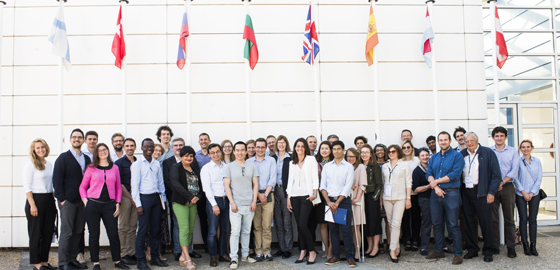Fourth Annual Research Day Ramps Up International Exchanges
The May 24-25 edition of the Society & Organization Research Day brought together leading researchers from the HEC Paris’ S&O Center and high-profile external faculty members to share their latest studies in a wide array of social fields. “With this workshop, you provide a privileged window into what’s coming in the near future,” commented one of this year’s three keynote speakers, Emilio Castilla of MIT, who is known for his research on workplace inequality and meritocracy. A look-back to this fourth edition featuring, for the first time, career development workshops with the guest speakers.

In so many ways, the annual S&O Research Day articulates one of the S&O Center’s primary goal: to deliver outstanding inter-disciplinary research on a wide variety of themes that are challenging our contemporary world. These include responsible financing, new business norms, work incentives and standards, public-private partnerships, NGO action plans, environmentally-sound energy sources and the transmission of groundbreaking knowledge to new generations of business leaders. Many of these topics found their way into the 17 research papers delivered in the course of HEC’s fourth annual S&O Research Day. 11 HEC members were joined by nine outside participants to share the latest findings in their respective research fields.
Introducing Career Development Workshops
What drives organizations to respond to customer feedback, asked Saverio Dave Favaron? What strategies can firms follow to increase their value capture in an ecosystem of complementary components, queried Elena Plaksenkova? What role does altruism play in prosocial rewarding referrals, wondered Fei Gao? These were just a few of the complex questions at the heart of the research presented by participants at the two-day workshop. All three happen to be PhD students at HEC Paris, students who were a clear focus for this fourth edition.
“Since the beginning, I thought of the S&O Research Day as a platform for PhD students to interact with faculty from inside and outside the school,” explains HEC Strategy Associate Professor and organizer Giada Di Stefano. “But this year was very special because this focus came out even more clearly thanks to the Career Development Workshops we added to the program for the first time. These consisted of three 90-minute sessions, one with each of the three external guests, where the students could reflect about what it takes to be successful in academia. We organized these in a more intimate setting that was meant to make them feel safe. These closed sessions were a time for the students - and only the students, - to ask all the questions they don’t dare ask us. I think they all benefited a lot from the exchanges.”
Intellectually Challenging
The PhD students certainly had world-class advice from the guest speakers this year. On top of Emilio Castilla, they exchanged with Patricia Thornton (Texas A&M) and Rajshree Agarwal (University of Maryland) on how to bring their works further forward. Agarwal’s sharp and informal advice for Elena Plaksenkova’s ongoing research, for example: “I loved it because of the implications of vertical differentiation within components for horizontal differentiation across components. It clearly focuses your study of individual-level data on the consumption of anti-HIV drug combinations. More generally, I find it novel that you explore ecosystem-shaping strategies.” Ways of moving forward? “Embrace your context, your hypotheses can be context-specific. And spend more time on how the R&D strategies are differentiated.”
All three guest speakers were asked to bring together their conclusions on the four papers they heard in their respective sessions – and they did so with brio. “I love these exchanges because they are so intellectually challenging,” comments Marieke Huysentruyt. The HEC researcher in business policy and strategy presented her own work on the “value of values” in comprehending the “distinctiveness and heterogeneity of social enterprises”. This follows the upsurge in interest about reinfusing values into organizational theory. “Each paper at Research Day was discussed in an open atmosphere with none of the boundaries you find at most conferences. You’re not put in a pigeonhole or referenced in any way.”
Cherry on the Cake
Giada Di Stefano also points to the cross-generational element of the four sessions spread over two days. “As usual, we saw former PhD students returning to HEC Paris to present the research they are currently doing, or just to attend the workshop,” she says. “It makes me proud to see them come back home and witness how much they have been growing over the years. It is so inspiring to feel part of a community that transcends the Jouy-en-Josas campus as it is here and now.” Her desire to maintain and expand the annual gathering was emphasized in her after-event conclusion: “This initiative does all of us some good. It is that time of the year where we all gather, old and new, faculty and non-, and we exchange, on a peer-to-peer basis. We present nascent work, we share and comment, we start co-authoring relationships. It’s a cherry on the cake after a long academic year!”
Since its inception nine years ago, the S&O Center’s 40 researchers have been studying how organizations tackle contemporary challenges like social inequality, technological disruption, liberalization, ethical imperatives, climactic evolution, etc. Its annually-organized Research Day clearly brings the intensity and informality needed to catalyze such crucial fields of study.